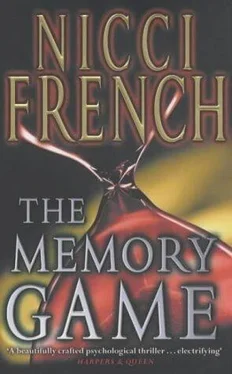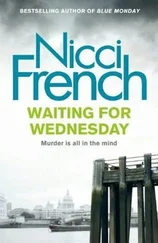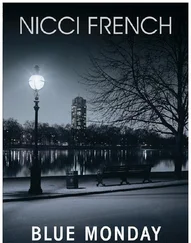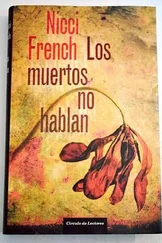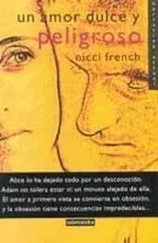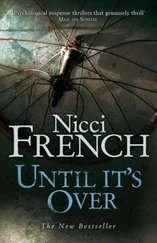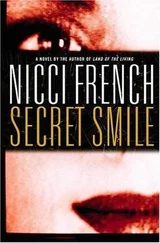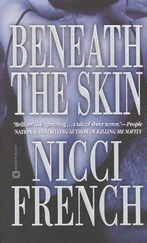Nicci French - The Memory Game
Здесь есть возможность читать онлайн «Nicci French - The Memory Game» весь текст электронной книги совершенно бесплатно (целиком полную версию без сокращений). В некоторых случаях можно слушать аудио, скачать через торрент в формате fb2 и присутствует краткое содержание. Жанр: Триллер, на английском языке. Описание произведения, (предисловие) а так же отзывы посетителей доступны на портале библиотеки ЛибКат.
- Название:The Memory Game
- Автор:
- Жанр:
- Год:неизвестен
- ISBN:нет данных
- Рейтинг книги:4 / 5. Голосов: 1
-
Избранное:Добавить в избранное
- Отзывы:
-
Ваша оценка:
- 80
- 1
- 2
- 3
- 4
- 5
The Memory Game: краткое содержание, описание и аннотация
Предлагаем к чтению аннотацию, описание, краткое содержание или предисловие (зависит от того, что написал сам автор книги «The Memory Game»). Если вы не нашли необходимую информацию о книге — напишите в комментариях, мы постараемся отыскать её.
The Memory Game — читать онлайн бесплатно полную книгу (весь текст) целиком
Ниже представлен текст книги, разбитый по страницам. Система сохранения места последней прочитанной страницы, позволяет с удобством читать онлайн бесплатно книгу «The Memory Game», без необходимости каждый раз заново искать на чём Вы остановились. Поставьте закладку, и сможете в любой момент перейти на страницу, на которой закончили чтение.
Интервал:
Закладка:
‘Just as a leaky house is better than no house,’ she said, ‘an imperfect marriage is better than a broken marriage. The single most destructive social issue of our time is the feckless and selfish behaviour of parents who place their own convenience before the future of their children.’
There was loud applause.
‘Fuck off,’ I yelled at the screen.
‘Sir Giles,’ said the chairman.
Sir Giles was a man in a grey suit.
‘Jill Cavendish is quite right,’ he said, ‘and we should none of us be ashamed to say quite categorically that this is a moral issue. And if our church leaders are not willing to give guidance on this, then it is time for us, the politicians, to act. As we know, there are young teenage girls who are quite deliberately becoming pregnant as a quick, easy way of getting a council flat. They are deliberately choosing a life on the dole at the expense of the rest of us. As a result, whole generations of children are growing up without moral guidance, without a father to guide them. No wonder these children turn to crime.
‘I think, ladies and gentlemen, it is time for the ordinary men and women of this country to stand up and say to the socialists, “This is what you have brought us to. This is the logical result of your policies, of the disregard for morality and the family that we saw in the 1960s.” They tell us to understand the plight of these feckless women. If you ask me, we should understand a little less and punish a little more. When I was a boy, a young girl knew that if she got pregnant she would be out on the street, an outcast. Perhaps we’ve got something to learn from those days. I’ll tell you this: if young girls knew that there was no housing for them, no dole money, then there’d be a darn sight fewer single mothers.’
‘Wanker,’ I said and threw my cigarette packet at the screen, missing wildly.
The applause from the audience was even more fervent than before and the chairman struggled to make himself heard.
‘We also have with us Dr Caspar Holt, who apart from being a philosopher also happens to be a single father with custody of a young daughter. Dr Holt, what’s your response to Sir Giles?’
The camera cut to the nervous-looking face of a middle-aged man who seemed familiar from somewhere or other.
‘I’m not sure I’ve got one, really,’ he said. ‘I distrust easy answers to complicated social problems. But I can’t help thinking that if Sir Giles Whittell really believes that young girls are getting pregnant as a matter of financial calculation, he should ask himself who created this individualist culture in which anything except the selfish struggle for maximum financial gain is literally unintelligible. I’m also, well, amused by the belief that the very rich can only be encouraged by giving them even more money while the very poor should be encouraged by taking their money away.’
I started clapping.
‘Hear hear.’
There was no other applause at all and the speaker was immediately subject to barracking from all sides. Then I remembered who he was. He was the man I had sat next to during Alan’s débâcle at the ICA. I had the impression that I had been rude to him. I felt a stab of remorse. I went to the desk in the corner and searched through a pile of postcards. A grotesque nude by George Grosz. Too explicit. The Annunciation by Fra Angelico. Too austere. Watercolours of British mice. Too twee. The Flaying of Marsyas by Titian. Too much like the way I felt. The Reverend Robert Walker Skating on Duddingston Loch. That was about right. I turned it over and removed some dried Blu Tack, a reminder that it had once been attached to the wall above my desk. ‘Dear Caspar Holt,’ – I was stuck and looked back at the screen where he was now murmuring something about nursery education and being shouted down – ‘I was the woman who was rude to you at the ICA. I’m writing this while watching you being sensible and brave on TV. I’m sorry that the one time I met you I behaved not very well. This isn’t very coherent but you’re saying the sorts of things I want to say but never think of at the time. Yours, Jane Martello.’ I found a stamp in my purse and went straight out and posted the card. I needed some fresh air. The cold of the evening felt good, insofar as I could feel it.
Seventeen
‘Do you remember how you used to come here to play?’
Although it was bitterly cold, Martha had insisted that we walk round the garden together. We stood by the giant oak tree, inside whose vast, hollow trunk we had hidden as children. I rubbed my hand over the mossy bark.
‘Here’s where Claud and Theo and Paul carved their initials. We thought they’d last for as long as the tree. They’ve nearly disappeared.’
We walked on in silence. I felt that I was treading in the footsteps of my childhood. The barns, the fallen trees, the stone walls, the herb garden, the flat patch where there used to be a swing, the skeletal branches, emaciated shrubs. When the wind blew Martha’s jacket flat against her body, I realised how thin she’d become.
‘Are you all right, Martha?’
She stooped gracefully to pluck up a weed.
‘I have cancer, Jane.’ She held up her hand to stop me from saying anything. ‘I’ve known for a long time. It started as breast cancer, but it’s spread.’
I took her chilly hand in my own and stroked it. The wind rushed at us from over the brow of the hill.
‘What do the doctors say? What are they doing?’
‘Not much. I mean, they don’t say much, let me draw my own conclusions. And I’m not going to have chemotherapy or radiotherapy or anything, except pain relief of course. I’m sixty-seven, Jane, that’s a good time to get cancer: it advances more slowly.’ She laughed. ‘I’ll probably die of a stroke at ninety-three.’ Then, more soberly: ‘I hope so. I can’t imagine Alan managing very well on his own.’
‘I’m sorry. I’m really so sorry, Martha. I wish that there was something that I could do.’
We walked back towards the house hand in hand.
‘Martha,’ I said abruptly, ‘do you wish that the body had never been found?’
She looked at me strangely.
‘That’s not a question that makes any sense,’ she replied at last. ‘We found Natalie, and that’s that. If you mean, was I happier before that, then the answer is yes, of course I was. I was even happy, sometimes. When Natalie was found, I had to start the mourning all over again. That old raw grief.’
She pushed open the back door.
‘Let me make you some tea.’
‘I’ll make it,’ I said.
‘I’m not dying yet, Jane; sit down.’
I sat at the kitchen table, and noticed that Martha had made piles of all the children’s books she had illustrated over the years. There were dozens. I started leafing through them. The pictures were familiar, of course, my own children had grown up on them, but still as wonderful as ever: funny, crowded and very colourful. She loved drawing large families: energetic grannies and harassed-looking parents and hordes of minute children with scabby knees and messy hair. There was lots of food in her illustrations – the kind of food that children love, like sticky chocolate cake, and wobbly purple jellies with bright yellow custard on top; mountains of spaghetti quivering on plates. And she loved drawing children running wild: over one double page spread a line of tiny, paunchy toddlers marched in red wellingtons; on another, children’s faces peered joyously through the branches of trees. I paused at a drawing of a small girl holding a daisy chain, while a stupendous orange sun set behind her. It was unusual for Martha to draw children on their own-usually they were outnumbering and overpowering the adults.
Читать дальшеИнтервал:
Закладка:
Похожие книги на «The Memory Game»
Представляем Вашему вниманию похожие книги на «The Memory Game» списком для выбора. Мы отобрали схожую по названию и смыслу литературу в надежде предоставить читателям больше вариантов отыскать новые, интересные, ещё непрочитанные произведения.
Обсуждение, отзывы о книге «The Memory Game» и просто собственные мнения читателей. Оставьте ваши комментарии, напишите, что Вы думаете о произведении, его смысле или главных героях. Укажите что конкретно понравилось, а что нет, и почему Вы так считаете.
